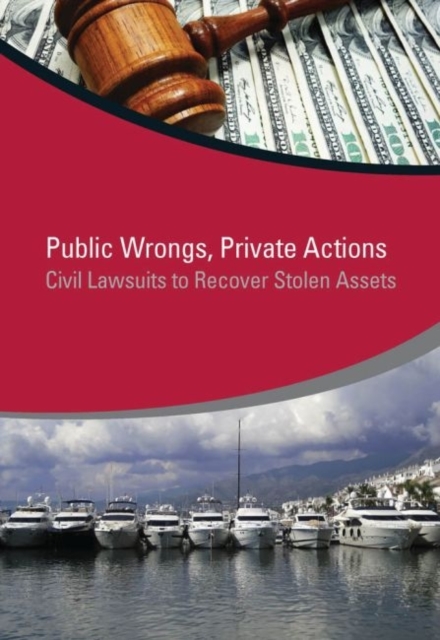
Public wrongs, private actions : civil lawsuits to recover stolen assets Paperback / softback
by World Bank, Jean-Pierre Brun
Paperback / softback
Description
Corruption and thefts of public assets harm a diffuse set of victims, weakens confidence in public institutions, damages the private investment climate, and threatens the foundations of the society as a whole.
In developing countries with scarce public resources, the cost of corruption is an impediment to development: developing countries lose between US$20 to US$40 billion each year through bribery, misappropriation of funds, and other corrupt practices.
Corruption is by no means a "victimless crime." This study aims to explore the standing of States and Government entities as victims and the possible recourse to private actions to redress public wrongs.
States and Government entities may act as private litigants and bring civil suits to recover assets lost to corruption.
The goal of this work is to promote knowledge and understanding as well as to increase the use of civil remedies and private lawsuits to recover stolen assets in the context of the United Nations Convention against Corruption (UNCAC) offences.
The UNCAC, the global standard for the fight against corruption, does not contain a legal definition of corruption itself but lists an array of offences, including public and private sector bribery and the embezzlement of public and private sector funds.
The study will mainly focus on these two types of corruption, namely bribery and embezzlement of funds.
This study is not intended in any way to minimize the importance of criminal proceedings and confiscation in addressing acts of corruption.
Rather, it will show that civil law remedies can effectively complement criminal penalties by attacking the economic base of corrupt activities both in the public and the private sectors.
In fact, given the magnitude of the challenges, all avenues of asset recovery, be they criminal or civil, should be explored simultaneously in order to tackle corruption from each and every angle and achieve the goals of deterrence and enforcement.
Hence, while criminal law expresses society's disapproval of the corrupt acts and aims at dissuasion, punishment, and confiscation of illicit proceeds, civil law focuses on victims' interests and aims at compensation and restitution.
These procedures may occur sometimes in parallel, sometimes sequentially.
An effective response to corruption very often requires concomitant use of both criminal and civil law remedies to achieve the desired result.
Information
-
Item not Available
- Format:Paperback / softback
- Pages:152 pages, figs, tables
- Publisher:World Bank Publications
- Publication Date:30/09/2014
- Category:
- ISBN:9781464803703
Information
-
Item not Available
- Format:Paperback / softback
- Pages:152 pages, figs, tables
- Publisher:World Bank Publications
- Publication Date:30/09/2014
- Category:
- ISBN:9781464803703






